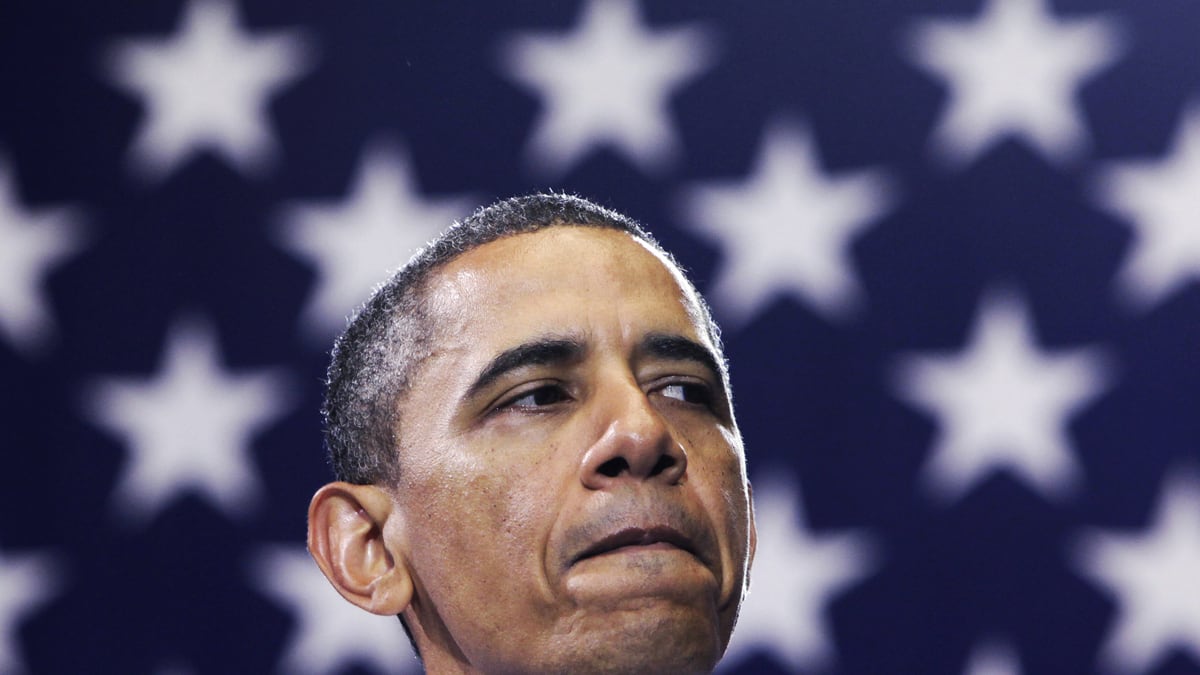There was a moment—after he appealed for reason, blamed the Republicans, recited the numbers, invoked Ronald Reagan—that President Obama seemed filled with fervor.
He was not going to be party to “driving a bunch of poor kids off the Medicaid rolls,” or penalizing the “working stiffs out there,” the people who “don’t have lobbyists.”
These are standard Democratic talking points, to be sure, but when you strip everything else away, when you try to locate the remnants of the audacity of hope, this is why Obama thinks he ran for president.
As he announced the collapse of the debt negotiations Friday evening after House Speaker John Boehner pulled the plug, Obama appeared to offer an answer to those, many of them in his own party, who wonder: Does he have a breaking point?
To some diehard Democrats, Obama always seems willing to meet the opposition more than halfway in the service of getting a deal done. He put their sacred programs, Medicare and Social Security, on the table without securing a Republican commitment to raise a dollar in taxes. His own partisans weren’t clear whether he had a line in the sand that he would refuse to cross.
It’s not that the president is certain to prevail in this debilitating impasse. Both parties, as has been clear for some time, are headed for an ugly short-term fix to avoid a government default on August 2. Whatever promises they make about grand bargains, it’s all about dodging an economic bullet at this point.
As Obama sees it, he has given ground time and again, taking on his own party over entitlements, and can’t get the House Republicans to cede an inch. As Boehner’s side sees it, they have made clear from the beginning that they don’t think tax increases are the answer, even if Obama portrays it as closing loopholes for oil companies and jet owners.
There was a plaintive tone to the president’s voice as he listed the $1.6 trillion in spending cuts he has offered—along with $1.2 billion in increased revenues—that if anything was “unbalanced” toward the GOP side. Can the Republicans “say yes to anything”?

What does a guy have to do to get a deal around here, anyway?
Recent polls show more people blame the Republicans than the White House for the gridlock that has brought the country to the brink of default. In a Fox News survey, 47 percent put the onus on the GOP, 32 percent on Obama. Still, Obama is especially concerned about how the gridlock is being portrayed. He urged reporters not to portray the battle as a “food fight.” He said it was “inexcusable” for politicians—by which he meant Republicans—to listen to “what some talk radio host says” or “what some columnist says.” It was as if Obama believes that Rush Limbaugh is holding up the deal.
The truth is Boehner probably couldn’t accept Obama’s package if he wanted to. He has to get to 218 votes, and his caucus hates anything that smells of a tax increase. He said the administration had moved the goal posts on Thursday by demanding an additional $400 billion in revenue beyond what had previously been worked out.
“The White House is simply not serious about ending the spending binge that is destroying jobs and endangering our children’s future. A deal was never reached, and was never really close,” Boehner wrote his colleagues.
In an effort to ratchet up the pressure, a senior White House official told Reuters that the country faces the “very real prospect” that its credit rating will be downgraded, and Obama laid the groundwork for blaming any change in Social Security payouts on the GOP.
On one level, the president can hardly believe he is up against this particular wall. Raising the debt ceiling is usually a “formality,” he said. Reagan did it 18 times. (Of course, Obama neglected to mention that he once voted against the formality during the Bush years.)
It is also true that Obama has made major compromises in terms of spending cuts. But the crisis gives the House Republicans a degree of leverage that they are loath to easily surrender.
In summoning congressional leaders to the White House on Saturday, Obama is starting an end game that will have one goal: getting the country off the default hook for now. Both sides will have an interest in papering over the compromise with elaborate formulas about future cutbacks.
But this is a turning point for the Obama presidency, and he seems to know it. He has been fighting some version of this budget battle since the day he started campaigning, and suffered a stinging setback last November. He is now signaling that he has gone as far as he can go in search of a deal. The question is whether he can make it stick.





